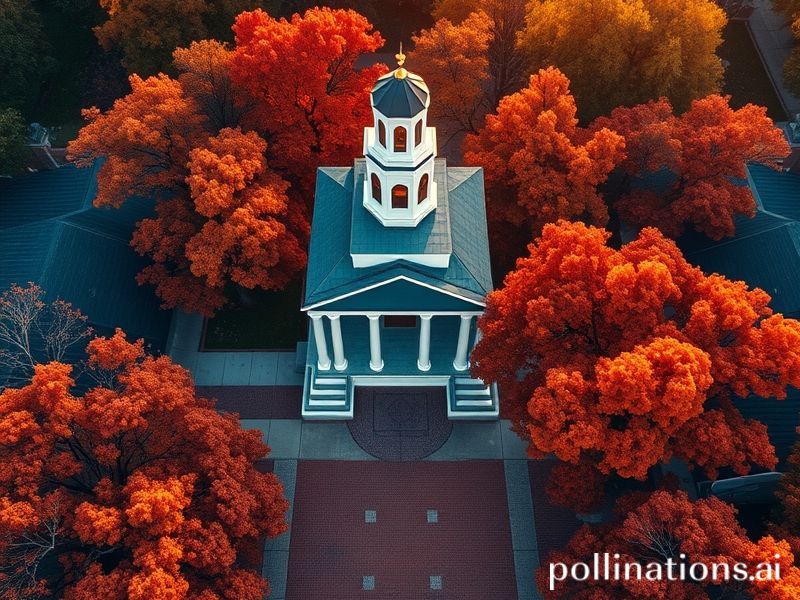Wake Forest University: How a Sleepy Southern Campus Became a Global Export Hub for Merit, Moral Ambiguity, and 7-Foot Estonians
Wake Forest University, an emerald outpost of red-brick collegiate Gothic tucked into the Piedmont of North Carolina, looks at first glance like the sort of place where tomorrow’s hedge-fund demigods practice lacrosse between networking brunches. Yet the school—named for a village that itself was named for the simple act of waking up near trees—has quietly become a minor node in the global circuitry that decides which ideas, and which people, get to travel. In a century when every campus is a potential export platform for ideology, inequality, or innovation, Wake Forest’s small footprint offers a sardonic case study in how even a “medium-sized, highly caffeinated Southern liberal-arts colony” can punch above its weight class.
Start with the student body: 5,400 undergraduates culled from 47 countries, including a non-trivial delegation from China whose parents view Winston-Salem as a safer bet than Beijing’s air quality and a cheaper Plan B than NYU. The admissions office—whose glossy brochures boast of “Pro Humanitate” (Latin for “we’re working on the humanity thing”)—now competes with the University of Melbourne and Sciences Po for the same global meritocracy, a contest that resembles an arms race fought with SAT scores and TikTok influencer endorsements. Meanwhile, Saudi Arabia’s scholarship spigot still drips, though less generously since Riyadh discovered it could buy entire English football clubs for the price of a freshman cohort.
The curriculum has globalized in ways both noble and absurd. A biotech lab partners with teams in Rwanda to prototype malaria-detecting paper strips—laudable, though one suspects the venture-capital pitch deck mentions “data monetization opportunities in emerging markets” before it mentions mosquitoes. The business school’s “Center for Energy, Environment, and Sustainability” hosts forums on carbon credits, where executives in Patagonia vests sip ethically sourced coffee while plotting how to sell the planet’s remaining breathable air. The joke, of course, is that the carbon footprint of their flights to get here could power a small Balkan republic for a week.
Then there’s Wake Forest’s accidental soft-power export: Demon Deacon basketball. The 2023 signing of a seven-foot Estonian prodigy turned a regional ESPN+ curiosity into must-watch pirated streams from Tallinn to Tbilisi, proving once again that American universities are the NBA’s minor leagues with better dining halls. The moment the kid drained a three-pointer against Duke, enrollment queries from the Baltic states spiked 40 %. Somewhere, an underpaid admissions officer is drafting a slogan: “Study Accounting—Also We Have Giants.”
Faculty, meanwhile, oscillate between ivory-tower idealism and the grim realities of academic gig work. A newly tenured political scientist who once advised the U.N. on peacekeeping now spends office hours calming anxious Gen-Zers about TikTok bans—because nothing says “geopolitics” like explaining Section 702 of FISA to someone who learned world affairs from memes. Adjuncts cobble together rent by teaching “Global Happiness” seminars, whose reading list includes Bhutanese policy papers and, ironically, the latest World Misery Index.
The campus itself is a masterclass in cognitive dissonance. On one quad, a meditation labyrinth invites stressed seniors to contemplate impermanence; on the next, a gleaming sports-science facility tracks their every VO2 max like they’re thoroughbreds at Keeneland. Sustainability pledges adorn LEED-certified dorms that overlook parking lots built for Ford F-150s. A chapel bell rings at sunset, its bronze paid for by a donor whose fortune derived from subprime mortgage algorithms—because nothing absolves late capitalism like a well-timed hymn.
And so Wake Forest glides on, a polite Southern host offering artisanal grits to the world while the world, in turn, outsources its anxieties, ambitions, and occasional money-laundering schemes to this manicured cul-de-sac. The university’s greatest export may ultimately be the illusion that somewhere, somehow, the Enlightenment still has a lawn. Meanwhile, the planet keeps warming, the debts keep compounding, and the Deacons keep recruiting. Pro Humanitate, indeed—just don’t ask for the itemized receipt.







